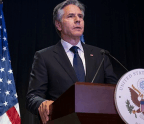Transcript: Paul Ryan's Full Interview With NPR's Steve Inskeep

President Trump wants a tax overhaul plan passed by Christmas. Both the Senate and the House have versions of the plan with the goal of cutting taxes. Morning Edition host Steve Inskeep talks to House Speaker Paul Ryan about the tax overhaul measures, and the rash of sexual harassment and sexual assault allegations being made public. Here's the full transcript of their conversation. The audio on this page is an edited version of the interview that was broadcast on Morning Edition.
Steve Inskeep: I want to begin by asking you about tax reform. I know that any tax reform measure has winners and losers. People who gain, people who lose money. But you're choosing here who the winners and losers are. What do the choices you've made say about your priorities?
We wanted a middle class tax cut. We wanted to have a system that's more fair. much simpler. Right now the tax code is just chock full of special interest carve-outs and deductions and loopholes. When you take away those loopholes, in exchange for lower tax rates and a broader tax base, people who are very sophisticated who use all those loopholes will not have all those loopholes. But the exchange is lower tax rates across the board for most taxpayers in a simplified system. By doubling the standard deduction, instead of 70 percent of Americans being able to fill an easier tax form, nine out of 10 Americans can fill out their taxes on a post card. So by simplifying the system that way and reducing loopholes, you can actually simplify dramatically and lower tax rates across the board.
So that was your goal, was a middle-class tax cut. But what does it say that — in practice according to independent analyses, I mean you do have winners and losers, not everybody gains, businesses gain, people with large estates to leave to their heirs gain, high-income people gain — but a lot of middle-income people do not gain in terms of money.
I disagree with that. The average tax cut for a middle-class family is going to be $1,182.
Average, meaning not everybody.
So that's when you run numbers on average taxpayers. This is designed to be a middle-class tax cut. I think the people who are concerned the most are some of the big businesses. That's where we hear most of the complaints about. But this is a middle-class tax cut, no two ways about it. I just ran the numbers of Wisconsin. The median family of four, the median household of four gets about a $2,000 tax cut on average. So it is a middle-class tax cut. Here's — just do the math. Instead of your first $12,000 being tax-free, as a couple your first $24,000 are tax-free. You pay lower tax rates up the income scale until you come to the top tax bracket, which is a million dollars. You have your child tax credit go from $1,000 per child to $1,600 per child. So things like that clearly produce tax relief for middle-income taxpayers. You mentioned businesses. I think it's very important — we have to recognize that we're in a 21st-century global economy, that we have to compete. And when we tax our businesses at far higher tax rates than our foreign competitors tax theirs, that puts us at a huge competitive disadvantage and we have to fix that and that's one of the things we do in this bill.
OK, so a few things to follow up on there. First you mentioned the rates do go down for a lot of people. At the same time, a lot of deductions go away and it's not necessarily what you'd
You’re reading a preview, subscribe to read more.
Start your free 30 days





